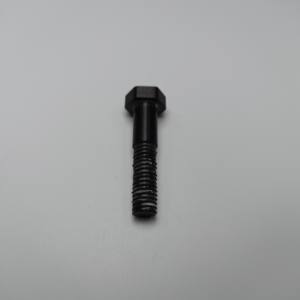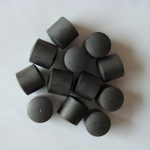Discover Premium Ceramic Products | Durability & Elegance United | Advanced Ceramics
PRODUCT PARAMETERS
Description
Overview of Silicon carbide ring
Silicon carbide balls are spherical particles with silicon carbide (SiC) as the main component. Silicon carbide is a compound synthesized by high temperature from silicon (Si) and carbon (C), and has a covalently bonded crystal structure. In its chemical composition, the atomic ratio of silicon and carbon is close to 1:1, and the purity of silicon carbide balls can vary depending on different application requirements. Generally, the purity of high-purity products can reach more than 98%.
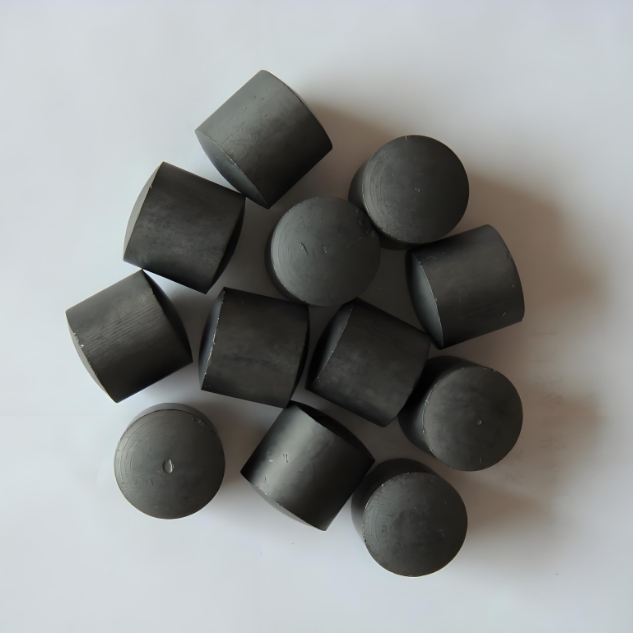
Silicon Carbide Fine Ball
Features of Silicon carbide fine ball
Silicon carbide fine balls have the following characteristics:
High hardness: Silicon carbide itself has extremely high hardness, close to diamond in the Mohs hardness scale, which makes silicon carbide fine balls have excellent wear resistance, maintain good shape and cutting ability in applications such as grinding and polishing, and effectively improve processing efficiency and quality.
High strength: It has high mechanical strength, including compressive strength and bending strength, and can withstand large external forces and pressures without being easily broken or damaged. It is suitable for various occasions requiring high-strength materials, such as key components in some high-speed rotating or high-impact equipment.
High purity: It usually has high purity and low impurity content, which helps to ensure the stability and consistency of its performance. It can play an important role in some fields with high requirements for material purity, such as semiconductor manufacturing, electronic circuit components, etc.
Good wear resistance: During the friction process, the surface wear of silicon carbide fine balls is relatively small, and its dimensional accuracy and surface finish can be maintained for a long time, thereby reducing the replacement frequency and reducing the cost of use. It can be used to manufacture wear-resistant parts or added to other materials as a wear-resistant additive.
Low coefficient of friction: Its surface is relatively smooth, and the friction generated when it contacts other objects is small. It has certain self-lubricating properties. This feature can not only reduce energy loss but also reduce equipment wear and heat generation and improve equipment operation efficiency and service life.
Low thermal expansion coefficient: When the temperature changes, the size of the silicon carbide fine ball changes relatively little, has good thermal stability, can maintain good performance in a high-temperature environment, and is not prone to deformation, cracking and other problems due to thermal expansion and contraction. It can be used in high-temperature furnaces, aerospace and other fields.
High thermal conductivity: It has good thermal conductivity, can quickly conduct heat, and is helpful for heat dissipation and temperature control. In some equipment or processes that require heat dissipation, such as electronic component heat dissipation, high-temperature chemical reactors, etc., it can effectively improve the heat dissipation efficiency and prevent local overheating.
Corrosion resistance: It has strong corrosion resistance to chemical substances such as acids and alkalis, can still maintain stable performance in harsh chemical environments, is not easily corroded or oxidized, and can be used in some corrosive media processing or storage equipment.
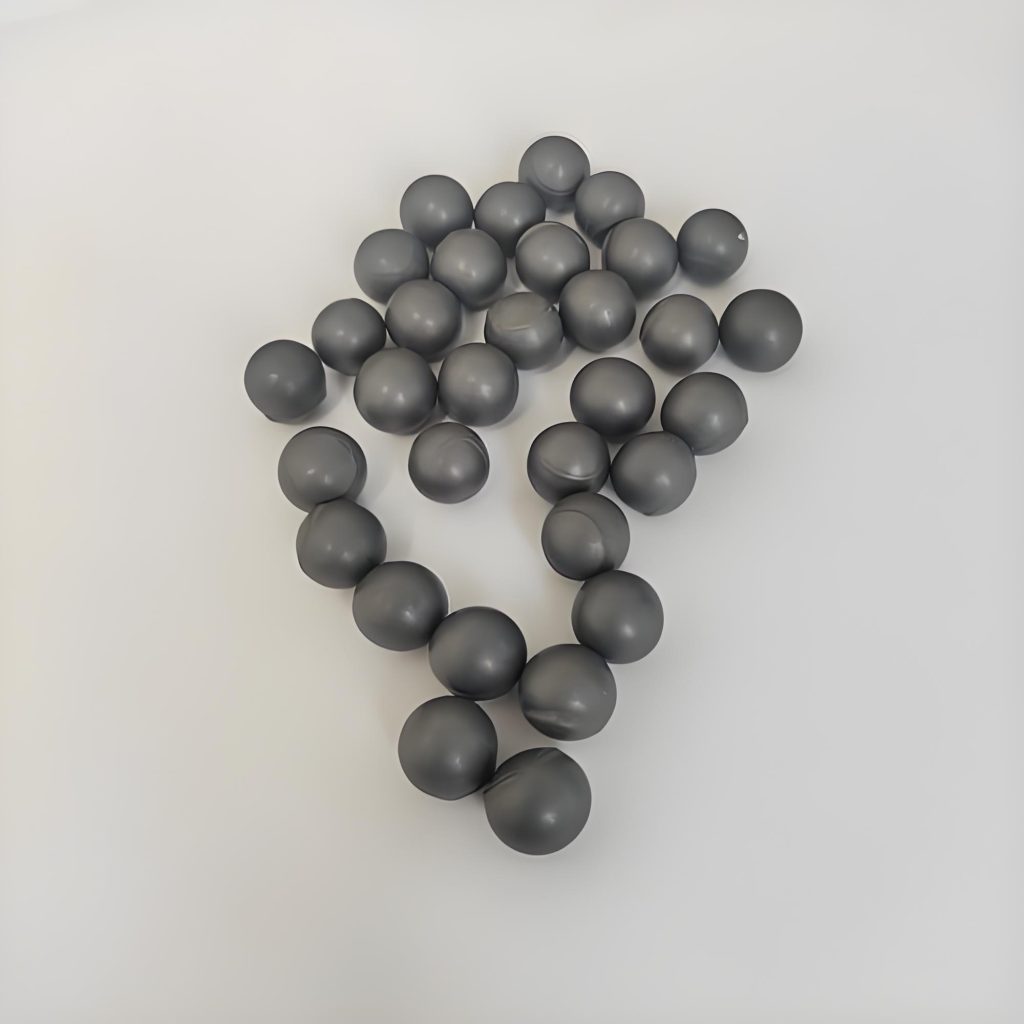
Silicon Carbide Fine Ball
Specifications of Silicon carbide fine ball
| Parameter | Specification Details |
| Material | Silicon Carbide (SiC) |
| Purity | ≥ 98% SiC |
| Hardness (Vickers) | ~2500-3000 HV |
| Density | ~3.21 g/cm³ |
| Sphericity | > 99% roundness |
| Surface Finish | Polished or ground, with surface roughness Ra |
| Diameter Tolerance | ±0.001 mm (varies by size) |
| Sphericity Tolerance | < 0.5 µm |
| Roundness Tolerance | < 0.5 µm |
| Size Range | Typically from 0.1 mm to 10 mm |
| Coating Options | Available, e.g., TiN, DLC (if applicable) |
| Temperature Resistance | Up to ~1600°C in inert atmosphere |
| Corrosion Resistance | Excellent in many environments |
| Electrical Conductivity | Can be electrically conductive or insulating |
| Magnetic Properties | Non-magnetic |
| Application | Bearings, valves, nozzles, etc. |
Applications of Silicon carbide fine ball
Grinding and polishing fields
Optical industry: Silicon carbide balls play a key role in the manufacturing process of optical components such as optical lenses and prisms. Its high hardness can accurately grind and polish optical surfaces, effectively remove materials and make optical components reach extremely low roughness. For example, in the production of camera lenses, silicon carbide balls can grind the lens surface extremely smooth, ensuring that light can be accurately refracted and reflected, thereby obtaining clear imaging effects.
Semiconductor processing: In semiconductor manufacturing, silicon wafers need to be finely polished. Silicon carbide balls are used in the chemical mechanical polishing (CMP) process to flatten the surface of silicon wafers. This is crucial for the subsequent deposition of thin films on silicon wafers and the manufacture of high-precision integrated circuits because the flat surface helps to improve the performance and integration of semiconductor devices.
Bearings
High-speed precision bearings: The low friction coefficient and high strength characteristics of silicon carbide balls make them very suitable for high-speed and high-precision bearings. For example, in the spindles of precision machine tools such as CNC lathes and milling machines, the use of silicon carbide ball bearings can significantly reduce vibration and heat generation. This is because its low friction performance can reduce energy loss and wear, while its high strength ensures the stability of the bearing under high-speed rotation, thereby improving the machining accuracy and surface quality of the workpiece.
Aerospace bearings: In the aerospace field, bearings are subject to extreme conditions such as high speed, high load and wide temperature range. Silicon carbide precision balls can withstand this harsh operating environment and perform reliably in aircraft engines and other rotating parts, helping to ensure flight safety and efficient operation of equipment.
Industrial valves: Silicon carbide precision balls can be used as valve balls. Due to its excellent corrosion resistance, it can be used to handle corrosive fluids such as acids and alkalis. In the chemical industry, this precision ball can ensure that the valve is tightly closed and accurately controls the flow rate in pipelines that transport corrosive chemicals.
Valves and pumps
High-pressure pumps: Silicon carbide precision balls can be used in high-pressure pump internal components such as check valves. Its high strength and wear resistance can withstand the high-pressure impact and continuous friction of the pumped fluid, thereby extending the service life of the pump and improving the reliability of the pump operation.
Ceramic and composite reinforcement
Ceramic-based composites: Silicon carbide balls are added to ceramic-based composites to enhance the mechanical properties of the composites. As a reinforcing phase, they can improve the toughness and strength of ceramics. For example, in the manufacture of ceramic cutting tools, the addition of silicon carbide balls can reduce the brittleness of ceramic materials, making them more resistant to chipping and cracking during cutting operations.
Polymer-based composites: Silicon carbide balls can also be used as fillers in polymer-based composites to improve the wear resistance and thermal conductivity of composites. This is very useful in applications such as manufacturing wear-resistant coatings and heat-dissipation materials.

Company Profile
Advanced Ceramics founded on October 17, 2014, is a high-tech enterprise committed to the research and development, production, processing, sales and technical services of ceramic relative materials and products.. Since its establishment in 2014, the company has been committed to providing customers with the best products and services, and has become a leader in the industry through continuous technological innovation and strict quality management.
Our products includes but not limited to Silicon carbide ceramic products, Boron Carbide Ceramic Products, Boron Nitride Ceramic Products, Silicon Carbide Ceramic Products, Silicon Nitride Ceramic Products, Zirconium Dioxide Ceramic Products, Quartz Products, etc. Please feel free to contact us.(nanotrun@yahoo.com)
Payment Methods
T/T, Western Union, Paypal, Credit Card etc.
Shipment Methods
By air, by sea, by express, as customers request.

FAQs of Silicon carbide fine ball
1.What is the typical size range of silicon carbide fine balls?
A: Silicon carbide fine balls can range in size from a few microns to several millimeters. The size depends on the specific application. For example, in precision polishing of semiconductor wafers, very fine balls with diameters in the range of a few tens of microns might be used. In applications like bearings for larger machinery, the diameter could be several millimeters to provide the necessary load-bearing capacity.
2.How are silicon carbide fine balls manufactured?
A: The manufacturing process typically involves powder synthesis and sintering. First, high-purity silicon carbide powder is produced through methods like the Acheson process (heating a mixture of silica and carbon in an electric furnace). Then, the powder is formed into spherical shapes, often through techniques such as spray – drying or granulation. After that, the pre-formed balls are sintered at high temperatures (usually above 2000°C) to densify them and improve their mechanical properties.
3.What are the main advantages of silicon carbide fine balls over other materials like steel balls in bearings?
A: Silicon carbide fine balls have a lower friction coefficient than steel balls. This means less energy is lost due to friction during operation, resulting in lower heat generation and higher efficiency. They also have higher hardness and better wear resistance. In high-speed or high-load applications, silicon carbide balls can maintain their shape and performance better than steel balls, which are more prone to deformation and wear under such conditions.
4.Can silicon carbide fine balls be used in corrosive environments?
A: Yes, silicon carbide fine balls have excellent corrosion resistance. They can withstand exposure to a wide range of corrosive substances such as acids, alkalis, and salts. This makes them suitable for applications in chemical processing plants, where they can be used in valves, pumps, and other equipment that come into contact with corrosive fluids.
5.How do you ensure the quality of silicon carbide fine balls?
A: Quality control measures include strict inspection of the raw materials to ensure high-purity silicon carbide powder. During the manufacturing process, parameters such as particle size distribution, sphericity, and density are carefully monitored. For example, the sphericity of the balls is measured using optical microscopy or advanced imaging techniques to ensure that they are as close to perfect spheres as possible. After production, mechanical property tests such as hardness, compressive strength, and wear resistance are carried through to verify that the balls meet the required standards.
6.In which industries are silicon carbide fine balls most widely used?
A: They are widely used in the semiconductor industry for wafer polishing and electronic packaging. The precision-machining industry uses them for grinding and polishing high-quality metal and ceramic parts. In the chemical industry, they are applied in corrosion-resistant equipment. In the aerospace and automotive sectors, they are used in high – performance bearings and other components that require high strength, low friction, and good wear resistance.
7.Can silicon carbide fine balls be recycled or reused?
A: In some cases, silicon carbide fine balls can be recycled and reused. If the balls are only slightly worn and their mechanical properties are still within an acceptable range, they can be cleaned and re-used in less-critical applications. However, for applications that demand high precision and performance, such as semiconductor wafer polishing, recycled balls may not meet the strict quality requirements and are usually replaced with new ones.
REQUEST A QUOTE
RELATED PRODUCTS
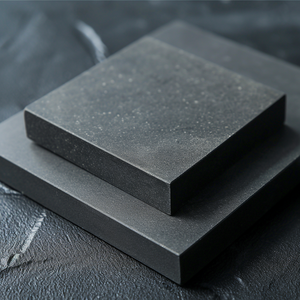
Dual Whetstone Set 400 1000 3000 8000 Grit 9pcs Knife Sharpening Composed Silicon Carbide Ceramic Alumina Abrasive Tools
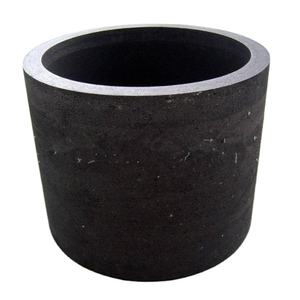
Electric Oven Igniter with Silicon Carbide Ceramic Hot Surface 5303935066 Accessory for Household Ovens
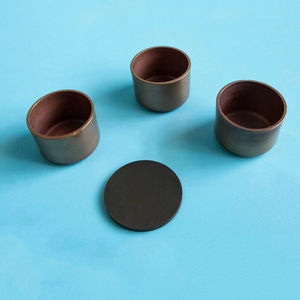
High Efficiency Customized Ceramic Parts for Industrial Use Silicon Carbide Plate Liner High Temperature Water Media OEM Support
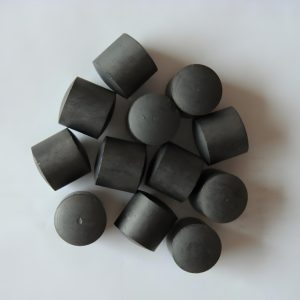
High Hardness Silicon Carbide Grinding Ball Wear Resistance SiC Grinding Ball
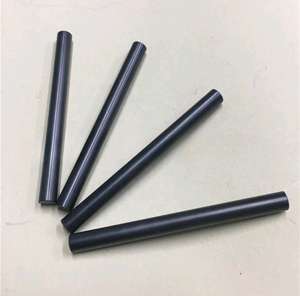
Refractory Nitride Bonded Silicon Carbide Sintered Sanitary Ware NSIC Ceramic Kiln Shelves
